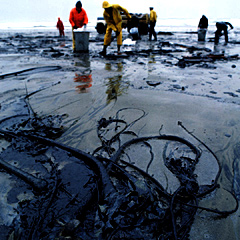 |
Atmospheric Administration |
**__Related stories:__***linkurl:Oil spill is boon to bacteria;http://www.the-scientist.com/blog/display/57448/
[25th May 2010]*linkurl:New NSF grants for oil spill;http://www.the-scientist.com/blog/display/57441/
[19th May 2010]*linkurl:Scientists brace for oil impact;http://www.the-scientist.com/blog/display/57410/
[17th May 2010]




















